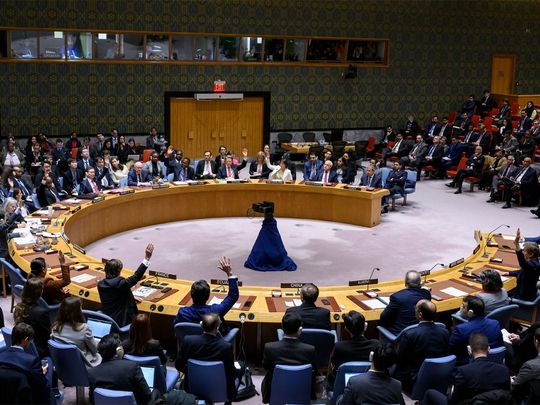
The UN Security Council has finally passed a resolution on March 25 calling for an immediate ceasefire during Ramadan, the release of hostages, and increased aid flow into Gaza. The US, while supporting the resolution’s objectives, abstained. The US emphasized ongoing diplomatic efforts and urged Hamas to accept the deal. The resolution passed with 14 votes in favor.
The UN Secretary-General António Guterres, however, has stressed the resolution’s crucial implementation. The abstention of the US and stressing that its policy remains unchanged raises questions if the parties of the conflicts are going to honor the resolution or not. Even if Israel stops its military operation for the Ramadan period, the absence of ‘permanent ceasefire’ from the text keeps the fear of Israeli operation in Rafah alive.
In the midst of the holy month of Ramadan, a time when peace, reflection, and community should prevail, Gaza finds itself embroiled in a crisis of unimaginable proportions. The ongoing Israeli offensive has not only disrupted the sanctity of this sacred month but has also precipitated a humanitarian disaster that calls for immediate global action.
The numbers speak volumes about the gravity of the situation. More than 32,000 Palestinians have been killed in Gaza. Over 75% of Gaza’s 2.3 million residents are displaced, with many having no choice but to move repeatedly in search of safety. Rafah, a town already burdened by its proximity to conflict zones, is now home to an estimated 1.5 million people, their numbers swelled by those fleeing northern areas.
Reminders of crisis’ severity
The health infrastructure is in ruins. With most hospitals non-operational and the remaining few struggling to function, the healthcare crisis escalates by the day. The World Health Organisation’s reports of children dying from malnutrition and dehydration at Kamal Adwan hospital are heart-wrenching reminders of the crisis’s severity.
As the world observes Ramadan, a month emblematic of compassion and empathy, the plight of Gaza’s residents cannot be overlooked anymore. The international community, especially the members of the United Nations Security Council, must transcend political divides and come together and act together to address this catastrophe and force the parties to honor the ceasefire resolution.
Speaking in Jordan, the UN Secretary General noted that what began as a solitary call from the UN for a ceasefire is now a widely recognized necessity among global entities. Guterres underscored the critical nature of preventing a ground invasion of Rafah by Israel, citing potential humanitarian catastrophes.
Last week’s veto by Russia and China of a US resolution calling for a ceasefire at the UN Security Council, albeit tied to a hostage deal, underscores the complexities of international diplomacy. Yet, it also highlights a troubling inertia at a time when decisive action is needed most.
The rejection of that resolution, primarily due to the vetoes from Russia and China, underlines a broader narrative of geopolitical maneuvering, where human lives and peace are entangled with the strategic interests of global powers. The humanitarian imperative should transcend geopolitical calculations. Gaza’s civilians, caught in the crossfire, deserve more than ambiguous resolutions or conditional ceasefires.
Agreeing on a permanent ceasefire
Washington’s previous vetoes of UN resolutions calling for a ceasefire and abstention this time have not gone unnoticed, painting the US as a nation prioritising strategic alliances over humanitarian concerns. Deciding not to veto the latest resolution seemed to be an effort by the US to recalibrate its stance, potentially offering a bridge to mend frayed international relations while addressing the urgent need for peace.
However, the vetoes from Russia and China should not merely be seen as opposition to the US stance. They signify a deeper contestation in the international arena, where humanitarian issues are often overshadowed by the pursuit of geopolitical clout. Russia and China’s decision to veto the resolution can be interpreted as a move to maintain their positions of influence.
The Security Council, after more than five months of failures, has finally managed to adopt a resolution that unequivocally demands an immediate ceasefire is not just a diplomatic victory; it is a moral one. The holy month of Ramadan should be a time of peace and contemplation, not a period of escalating violence and suffering.
In this moment of crisis, we must remember the shared values that unite us as a global community. Compassion, solidarity, and the protection of the innocent should guide our actions. The world must not stand by as Gaza endures this calamity. It is time for the Security Council and key member-states to act decisively, putting humanity above politics, to ensure an immediate ceasefire and the rapid delivery of much-needed humanitarian aid.
As we reflect on the values that Ramadan embodies, let us also remember our shared responsibility towards our fellow humans in distress. Let this Security Council resolution be a turning point, where the world unites to bring solace and support to the people of Gaza, reaffirming our commitment to peace, humanity, and the sanctity of life and agree on a permanent ceasefire.








